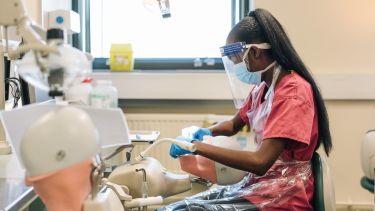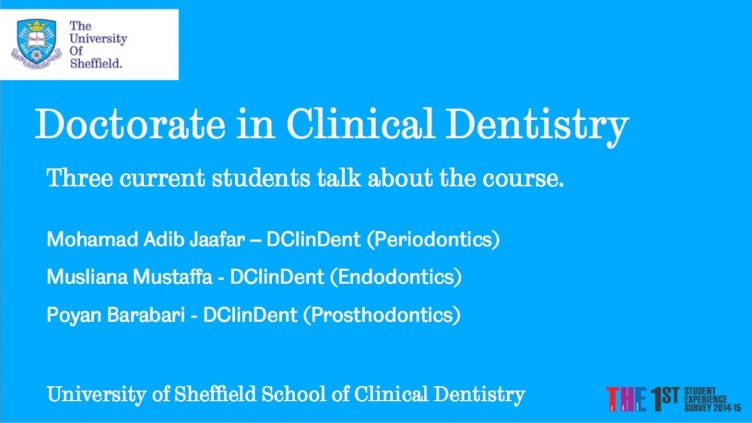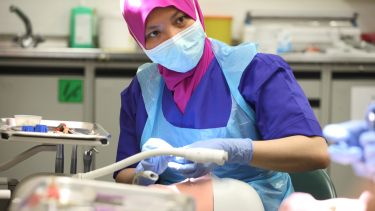Explore this course:
Applications for 2024 entry are now open. Apply now or register your interest to hear about postgraduate study and events at the University of Sheffield.
Endodontics
School of Clinical Dentistry,
Faculty of Health

Course description
The DClinDent is suited to all dentists who wish to pursue specialist training in one of the restorative mono-specialities and wish to prepare for the speciality membership examinations in endodontics, periodontology and prosthodontics of the Faculty of Dental Surgery of the Royal College of Surgeons of Edinburgh (RCSEd).
This is a three-year full-time clinical taught postgraduate course delivered by specialists. All three monospecialites run simultaneously with a common first year for all students across the three disciplines. This enables a strong multi-disciplinary grounding across all aspects of restorative dentistry. The second and third years are speciality-specific (Endodontics) and you will study and develop your knowledge and skills in close collaboration and interaction with students in the other two specialities. This model fosters a broad learning experience, beyond that of your chosen speciality. A 1:4 clinical tutor-student ratio supports excellent clinical teaching, feedback, reflection and mentoring.
You’ll have the opportunity to acquire knowledge and critical awareness of the issues that determine successful outcomes, informed by the latest research in restorative dentistry, in accordance with the requirements of the UK’s GDC specialist curricula. We’ll foster your ability to make sound judgements in complex and unpredictable situations, so you can plan and implement tasks at a professional level. You’ll learn how to communicate clearly and professionally to specialist and non-specialist audiences
Distinct and carefully mapped opportunities to work and interact with colleagues in the other two restorative disciplines and other hospital trainees will give doctorate students the opportunity to develop their skills in a multidisciplinary environment.
The first year of the course gives you a solid grounding in endodontic, periodontal and prosthodontic treatments. You’ll develop your clinical skills in our first-rate facilities and attend treatment planning clinics with course tutors. You’ll also carry out the literature review component of the research project.
In the second and third years, you’ll treat patients and focus on your specialism of endodontics. You’ll carry out the experimental component of the research project and complete a thesis of publication standard.
Final-year students (year 3) can choose to sit a conjoint examination. Successful candidates will be awarded the degree of DClinDent and speciality membership (RCSEd) in endodontics.
The University of Sheffield has a memorandum of agreement with RCSEd on conjoint examinations in endodontics. This memorandum recognises this three-year programme as providing sufficient equivalence that the RCSEd will permit registered candidates to sit the Membership Examination in Endodontics; if successful, candidates will be granted the RCSEd Membership in Endodontics (the “MEndo RCSEd”) and the DClinDent (Endodontics) from the University of Sheffield.

Modules
- Principles of Periodontal Treatment
-
This module develops knowledge and an in-depth understanding of the theoretical background and scientific basis of Periodontology and integration of periodontal treatment in total patient care. The aetiology, classification and diagnosis of periodontal diseases and the multifactorial nature of disease susceptibility will be considered regarding the role of major risk factors. The epidemiology of periodontitis and the interaction between systemic diseases will be considered. Clinical skills training will include management of simple/moderate periodontal disease by non-surgical and surgical means. Students, working singly and in groups, will seek knowledge through a range of learning modalities: Lectures, critical appraisals and skills practice.
15 credits - Principles of Endodontics Treatment
-
This module will develop knowledge in the diagnosis and treatment of endodontic disease. Students will obtain a foundation of basic science knowledge relevant to the understanding of Endodontology. They will develop relevant knowledge and clinical skills in the principles of root canal treatment and be able to carry out non-complex treatment. They will develop knowledge on how to assess and manage endodontic complications within the context of other dental specialties and so understand treatment options. Students, working singly and in groups, will seek knowledge through a range of learning modalities: Lectures, critical appraisals and skills practice. This module will develop knowledge in the diagnosis and treatment of endodontic disease. Students will obtain a foundation of basic science knowledge relevant to the understanding of Endodontology. They will develop relevant knowledge and clinical skills in the principles of root canal treatment and be able to carry out non-complex treatment. They will develop knowledge on how to assess and manage endodontic complications within the context of other dental specialties and so understand treatment options. Students, working singly and in groups, will seek knowledge through a range of learning modalities: Lectures, critical appraisals and skills practice. This module will develop knowledge in the diagnosis and treatment of endodontic disease. Students will obtain a foundation of basic science knowledge relevant to the understanding of Endodontology. They will develop relevant knowledge and clinical skills in the principles of root canal treatment and be able to carry out non-complex treatment. They will develop knowledge on how to assess and manage endodontic complications within the context of other dental specialties and so understand treatment options. Students, working singly and in groups, will seek knowledge through a range of learning modalities: Lectures, critical appraisals and skills practice.
15 credits - Principles of Conservative Dentistry
-
This module will develop knowledge in the diagnosis and treatment of caries and other conditions that impact negatively on the biological health and structure of teeth. Students will obtain a foundation of basic science knowledge relevant to the understanding of Prosthodontics. They will develop relevant knowledge and clinical skills in the principles of management of compromised teeth and the dentition as a whole using direct and indirect restorative systems. They will learn when and how to provide the most appropriate restorative modalities to restore function and aesthetics in a predictable and durable manner with due attention to the achievement of occlusal harmony. Students, working singly and in groups, will seek knowledge through a range of learning modalities: Lectures, critical appraisals and skills practice.
60 credits - Management of the Partially Dentate Patient
-
This module will develop knowledge and an in-depth understanding of the effect that loss of teeth has on function, aesthetics and the patient's psychological well-being. Students will develop an in-depth and critical understanding of the different restorative methods available for the restoration of function and aesthetics of a partial dentition in a predictable and durable manner. Students will develop the necessary skills to establish a diagnosis, prognosis and treatment strategy for the management of the partially dentate patient.
30 credits - Research Project Literature Review
-
Research is key to the practice of clinical dentistry. This unit will introduce students to the background reading and critical appraisal of the literature related to their chosen project.
30 credits - Clinical Practice Programme- New Patient I
-
The candidate will attend consultant clinics and case based discussion seminars which develop the skills required for Restorative Dentistry practice with an emphasis on the development of a multidisciplinary treatment strategy specific to the needs and expectations of an individual patient. The candidate will develop the skills to effectively communicate these treatment strategies to the patient and colleagues in primary or secondary care who may be required to execute them.
30 credits
- Research Methods in Clinical Dentistry
-
Research methods are a key part of clinical dentistry. This unit will aim to introduce students to patient-centred research methods and will include evidence-based dentistry, critical appraisal, research governance and ethics, quantitative and qualitative research methods, statistical appraisal of research reports.
15 credits - Principles of Clinical Management
-
This module introduces the basic concepts of clinical management of a patient including clinical governance, cross-infection control and radiology.
15 credits - Clinical Practice Programme - New Patient 2
-
The candidate will attend consultant clinics and case based discussion seminars which will develop competency in the skills required for Restorative Dentistry practice with an emphasis on the development of a multidisciplinary treatment strategy specific to the needs and expectations of an individual patient. The candidate will be competent at effectively communicating these treatment strategies to the patient and colleagues in primary or secondary care who may be required to execute them.
30 credits - Research Project: Experimental Work Data Collection
-
In this module, students will undertake experimental work and data collection aspects for their chosen research project under the direction of the supervisory team.
15 credits - Clinical Practice Programme - TOP1
-
This module provides the clinical experience for the candidate to become competent in the skills required for Restorative Dentistry practice. The emphasis is on the development of clinical skills within the monospecialty, but embraces a multidisciplinary treatment strategy specific to the needs and expectations of individual patients. Effective communication with colleagues, whilst managing patients for shared care will also be developed throughout this unit .
60 credits - Specialty Programme 1: Endodontics
-
This module will develop knowledge and understanding of the theoretical basis and practical skills to enable the competent management and treatment of endodontics and general restorative inter-disciplinary cases to a specialist level in accordance with the requirements of the GDC's Specialist Curricula.
45 credits
- Clinical Practice Programme - New Patient 3
-
The candidate will attend consultant clinics and case based discussion seminars, during which they will demonstrate proficiency in the skills required for Restorative Dentistry practice with an emphasis on the development of a multidisciplinary treatment strategy specific to the needs and expectations of an individual patient. They will become proficient at communicating these treatment strategies to the patient and colleagues in primary or secondary care who may be required to execute them.
60 credits - Research Project: Completion and Write Up
-
This unit will introduce students to the analysis and report writing aspects of research and preparation of a manuscript for submission to a scientific journal.
45 credits - Clinical Practice Programme - TOP 2
-
This module provides the clinical experience to develop the key skills of the specialist to a proficient level, including diagnosis, treatment planning and management of patients within the speciality and for patients requiring multidisciplinary care within restorative dentistry and other disciplines of dentistry. It will enable the student to develop a deeper understanding of treatment planning across the dental disciplines and monitoring of treatment outcomes.
60 credits - Specialty Programme 2: Endodontics
-
This module will develop knowledge and skills in the advanced techniques practiced at a 'Specilaist Level' and will consolidate an in-depth knowledge and understanding of the theoretical basis and practical skills needed. Thus enabling the proficient management and treatment of endodontic and general restorative inter-disciplinary cases to a specialist level in accordance with the requirements of the GDC's Specialist Curricula.
15 credits
The content of our courses is reviewed annually to make sure it's up-to-date and relevant. Individual modules are occasionally updated or withdrawn. This is in response to discoveries through our world-leading research; funding changes; professional accreditation requirements; student or employer feedback; outcomes of reviews; and variations in staff or student numbers. In the event of any change we'll consult and inform students in good time and take reasonable steps to minimise disruption.
Open days
An open day gives you the best opportunity to hear first-hand from our current students and staff about our courses.
Find out what makes us special at our next online open day on Wednesday 17 April 2024.
You may also be able to pre-book a department visit as part of a campus tour.Open days and campus tours
Duration
3 years full-time
Teaching
- Lectures
- Tutorials
- Seminars
- Demonstrations
- Clinical skills laboratory sessions
- Case-based discussion
- Extensive practical clinical experience
Assessment
- Competency-based continuous clinical assessments
- Formal examinations
- Oral presentations
- Written assignments
- Research project
Student profiles

The course is well organised, all sessions are interactive and very informative. I love lab sessions where I can improve my clinical skills by practising on extracted teeth and a model jaw. The supervisors are very helpful and their feedback helps me increase my knowledge and improve my skills.
Entry requirements
A university-accredited degree in dental surgery that enables the practice of dentistry and a minimum of two years’ post-qualification experience in any sphere of restorative dentistry, including a general dental practice.
You must also meet our health and Disclosure and Barring Service requirements for clinical courses.
Overall IELTS score of 7.0 with a minimum of 6.5 in each component, or equivalent.
If you have any questions about entry requirements, please contact the department.
Fees and funding
Apply
You can apply now using our Postgraduate Online Application Form. It's a quick and easy process.
Contact
dentalpgtadmissions@sheffield.ac.uk
+44 114 215 9318 or +44 114 215 9319
Any supervisors and research areas listed are indicative and may change before the start of the course.
Recognition of professional qualifications: from 1 January 2021, in order to have any UK professional qualifications recognised for work in an EU country across a number of regulated and other professions you need to apply to the host country for recognition. Read information from the UK government and the EU Regulated Professions Database.
